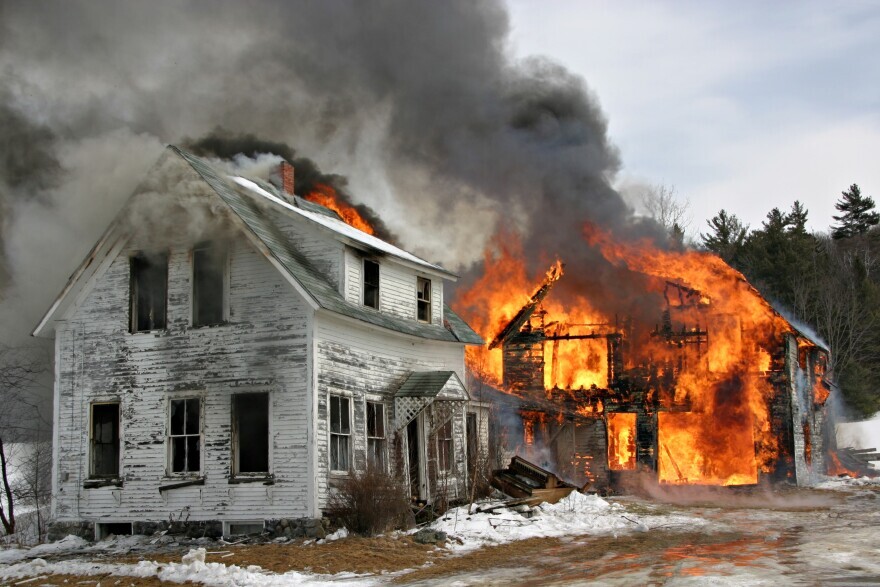In N.H., when temperatures drop, fires from heating equipment tend to spike. Here’s how to stay safe.

In 2015, fire departments from across the North Country used this abandoned farmhouse in Bethlehem as a venue for firefighting training exercises. (Chris Jensen/NHPR)
Heating equipment is a leading cause of fires in New Hampshire, according to state data. Winter months tend to be especially dangerous.
With a cold snap settling in, state fire authorities are urging people to check up on their home’s fire safety prevention measures.
“When we do have fatal fires in New Hampshire, more often than not, we find that there’s a lack of a working smoke alarm in the home,” New Hampshire State Fire Marshal Sean Toomey said.
He said testing those devices regularly — at least once a month — is one of the most important ways to avoid fire fatalities.
“I think I’m as guilty as anyone else,” Toomey said. “I need to remind myself, even as state fire marshal, to make sure I check them in my own home periodically.”
New Hampshire’s fire code requires smoke alarms in all single- and multi-family residential properties, regardless of when the home was constructed. State law also requires all rental housing to have working fire alarms. All rental housing is also required to have working fire alarms and functioning heating equipment, capable of keeping the livable parts of the rental unit at an average temperature of at least 65 degrees Fahrenheit.
If you’re a renter who’s worried that your home doesn’t meet these standards, here’s some advice on what to do.
If you live in a rental property and you’re having trouble ensuring your smoke alarms are installed properly, Toomey said you can reach out to your local fire department for help.
Working alarms are only part of staying safe, though. Here are some other steps to protect your home against fires, according to state and federal authorities:
- Be careful with space heaters. Make sure you only use these devices as directed, and keep them at least 3 feet away from anything that could catch fire — like clothing, bedding or curtains. When you leave the room or go to sleep, make sure to turn the device off.
- The same goes for fireplaces and wood stoves. The Federal Emergency Management Agency (FEMA) says a wood stove should be kept at least 3 feet from anything flammable. They also say any ashes should be stored in a metal container kept outside and at least 10 feet away from your home, and a fireplace or stove should always be extinguished when you go to sleep or leave your home.
- Use power cords with caution. Never plug a space heater into an extension cord, and limit each electrical outlet to only one heating appliance at a time.
- Have an escape plan. Make sure you know how to exit your home in an emergency and make sure that path is clear. Ideally, Toomey said you should have at least two possible exits, whether through a door or a window.
- Keep it clean. State officials advise having your heating system and vents inspected and cleaned each year.
- Don’t forget to vent. Carbon monoxide poisoning kills hundreds of people each year. According to Johns Hopkins Medicine, most of those exposures occur in the winter and often in connection with poorly vented space heaters. They advise “only us[ing] fuel-burning space heaters in well-ventilated areas,” and avoid using portable heaters in tents, campers or other enclosed spaces. The Consumer Product Safety Commission has more resources on how to use portable heaters safely here.
According to the New Hampshire Union Leader, fires killed at least 13 people across the state last year — up from eight the year before. In November, An electrical fire at a Manchester apartment building killed one woman and sent a local firefighter to the hospital.
In December, a local woman was found dead inside a camper where fire officials reportedly “found several propane tanks that were feeding the fire,” though it was unclear whether those caused the incident.
Other recent incidents across the country have underscored the urgency of residential fire safety prevention.
On Jan. 5, Philadelphia’s “deadliest single fire in at least a century” claimed the lives of at least 12 people, including eight children. As reported by WHYY, the rowhouse where the fire occurred was operated by the city’s public housing authority and “had battery-powered smoke alarms, no sprinkler system, and no fire escape.”
Just a few days later, a fire believed to be caused by a defective space heater — in a building where tenants complained about inadequate heating — killed at least 17 people in the Bronx.
For more news from New Hampshire Public Radio, visit NHPR.org.
